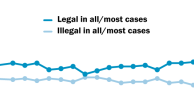
Many Catholics in the U.S. and Latin America Want the Church to Allow Birth Control and to Let Women Become Priests
Views vary on other ideas, such as recognizing same-sex marriages. Most see Pope Francis as a change in the church’s direction, and he’s broadly popular.



















